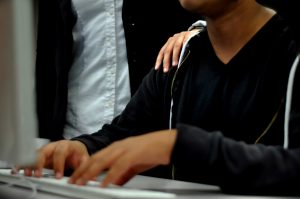YouTube is great. Not only are there a lot of talented musicians and comedians on the website, there are a lot of great educational channels like the Khan Academy. Almost all universities have channels where they post speeches and lectures.
 YouTube is starting to recognize this new batch of creators. Their new feature, YouTube EDU, aims to allow students to watch educational YouTube videos in the classroom at schools where access to the website had previously been blocked. This filter supposedly allows educational content — but not anything distracting — to get through to the students. And MVHS has jumped on board.
YouTube is starting to recognize this new batch of creators. Their new feature, YouTube EDU, aims to allow students to watch educational YouTube videos in the classroom at schools where access to the website had previously been blocked. This filter supposedly allows educational content — but not anything distracting — to get through to the students. And MVHS has jumped on board.
A video passes through the filter if it is placed in the “Education” category and YouTube’s monitors approve it. However, some unworthy material, like music videos and prank videos, are getting through to MVHS’ students, while legitimate educational material is being blocked.
One prominent example is Michael Stevens’ channel, “Vsauce”. Stevens has made numerous videos on subjects such as physics, astronomy and chemistry. However, he lists these videos as “Science and Technology”, keeping him out of the filter.
The simplest solution to counteract these flaws might be to withdraw from receiving YouTube EDU’s services and revert to relying on iPrism, which blocks all of YouTube’s content. Instead, the best solution is to do the exact
opposite.
Rather than blocking all of YouTube, the best solution would be to make the entire website accessible to students.
The Internet is the Internet. YouTube isn’t the only diversion out there, and plenty of other distracting websites, like Twitter, already make it through iPrism. It doesn’t matter which site students waste time on. The World Wide Web is too vast and uncontainable. The school’s network doesn’t impose any threat by only seizing control of this one site.
Much of that credibility is lost because MVHS grants its students a lot of freedom, but not when it comes to the Internet. Students can go off-campus during lunch. Students can freak at school-funded dances. But students cannot access a video-sharing website through the school’s network. And the school can’t simply demand to have control over this one tiny aspect of its students’ lives.
It doesn’t make any sense. High school is the step before college and adulthood. Some MVHS students are already 18 years old and therefore considered adults by the United States legal system. Administration treats its students like adults when it comes to leaving campus and dancing, but cringes at the idea of letting them watch videos of cats playing the piano on the Internet.
It’s like allowing your child to sky dive, but still feeling the need to hold his hand while crossing the street.
High school students know what’s right and what’s wrong. They know there is corrupt content on the Internet. Yet they also know there is educational value online. MVHS just needs to trust its students’ judgment.
The school should be acting as a guide. While still able to assert their power, they should still give students the freedom to make their own choices. Because in high school, students are no longer children.
They are young adults.




